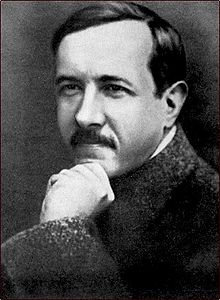Alexander Wassiljewitsch Tschajanow
Alexander Chayanov ( Russian Александр Васильевич Чаянов , scientific. Transliteration Aleksandr Vasil'evič Čajanov ; January 17 * . Jul / 29. January 1888 greg. In Moscow , † 3. October 1937 in Alma-Ata ) was a Russian agronomist , agricultural economist , University professor and art collector .
Life
Tschajanow studied 1906–1911 at the Moscow Agricultural Institute. He stayed there to prepare for a professorship and was sent to England , France , Germany , Switzerland and Italy for further training in 1912 . On his return he taught at the Municipal Moscow Schanjawski - People's University . In 1913 he became a lecturer at the Agricultural Institute and in 1915 adjunct professor.
After the February Revolution of 1917 , Tschajanow took part in the cooperative movement . After the October Revolution in 1918, he became a professor at the Moscow Agricultural Institute, which was now the Petrovskaya Agricultural Academy.
Tschajanow turned against the violent collectivization of agriculture in the USSR and found the displeasure of Josef Stalin . The best-known representative and spiritual leader of Russian agricultural science was dismissed as a professor at the height of the collectivization campaign and arrested in 1930. The NKVD accused him of being the head of the “Working Peasant Party” in the Central Black Earth Region . A show trial was conducted against him . Tschajanow was sentenced to five years in prison in 1932, the last of which was in exile in Alma-Ata . After his exile was extended, he was arrested again in March 1937 and shot as an alleged spy on October 3, 1937.
Tchajanov's second wife, Olga Emmanuilovna, née Gurewitsch (1897–1983) was arrested and spent 18 years in labor camps . She was the daughter of the publicist and revolutionary Emmanuil Lwowitsch Gurewitsch (1866–1952) and sister of the physicist Lev Emmanuilowitsch Gurewitsch (1904–1990) and worked as a theater scholar .
Tschajanow's son Vasily Alexandrovich Tschajanow researched the circumstances of his father's death and came into possession of the interrogation protocols in which Tchayanov was declared in an absurd way as the leader of an anti-Soviet party.
Tschajanow's main economic work The Doctrine of the Peasant Economy (1923) is highly valued today, especially by development economists. His work The Optimal Business Sizes in Agriculture (1930) is also particularly valuable .
Tschajanow is one of the Thünen researchers .
Alexander Tschajanow is also known as the author of neo-romantic stories and utopias:
- "The Story of a Barber's Dummy" (1918)
- "Journey of my brother Alexej to the land of rural utopia" (1920)
- "Wenediktow" (1922)
- "The Venetian Mirror" (1923)
- "The Incredible Adventures of Count Buturlin" (1924)
- "Julia, or encounters at the virgin monastery" (1928)
Tschajanow was enthusiastic about archeology and was a passionate bibliophile and collector.
Web links
- Literature by and about Alexander Wassiljewitsch Tschajanow in the catalog of the German National Library
- Biography (russian)
- Entry on lib.ru
- Gerd Spittler : Tschajanow and the theory of the family economy , PDF document (accessed on January 27, 2011).
Individual evidence
- ↑ a b German printmaking - Albrecht Dürer and his teachers: TSCHAJANOW, ALEXANDER WASSILJEWITSCH (1888–1937). MOSCOW (accessed February 15, 2019).
- ↑ Чаянов В. А., Петриков А. В .: А. В. Чаянов в следствии ОГПУ по делу Трудовой крестьянской партии (1930–1932 гг.) . In: Сельский мир. Альманах . Всерос. научн.-исслед. и культ.-просвет. о-во "Энциклопедия российских деревень", Всерос. ин-т аграрных проблем и информатики РАСХН, Moscow 1998, p. 4 .
- ↑ Jewreiskaja Wiki-enziklopedija: Чаянова, Ольга Эммануиловна (accessed February 15, 2019).
- ↑ Jewreiskaja Wiki-enziklopedija: Гуревич, Эммануил Львович (accessed February 15, 2019).
- ^ German prints - Albrecht Dürer and his teachers: GURJEWITSCH, EMMANUEL LWOWITSCH (1866–1952). MOSCOW (accessed February 15, 2019).
| personal data | |
|---|---|
| SURNAME | Tschajanow, Alexander Wassiljewitsch |
| ALTERNATIVE NAMES | Чаянов, Александр Васильевич (Russian); Čajanov, Aleksandr Vasil'evič (scientific transliteration) |
| BRIEF DESCRIPTION | Russian agricultural scientist, agricultural economist, university professor and art collector |
| DATE OF BIRTH | January 29, 1888 |
| PLACE OF BIRTH | Moscow |
| DATE OF DEATH | October 3, 1937 |
| Place of death | Alma-ata |
